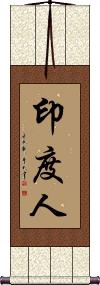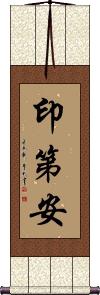Many custom options...
And formats...

Indian in Chinese / Japanese...
Buy an Indian calligraphy wall scroll here!
Personalize your custom “Indian” project by clicking the button next to your favorite “Indian” title below...
Indian
Native American / Indian
印第安 is the Chinese title for (American) Indian or Native American.
For disambiguation, this refers only to the indigenous people of North America.
印第安 is a transliteration, so it is meant to sound like the English word “Indian” using Chinese sounds.
This is not a common selection for a calligraphy wall scroll.
Not the results for Indian that you were looking for?
Below are some entries from our dictionary that may match your Indian search...
| Characters If shown, 2nd row is Simp. Chinese |
Pronunciation Romanization |
Simple Dictionary Definition |
蓮 莲 see styles |
lián lian2 lien ren れん |
More info & calligraphy: Lotus(out-dated or obsolete kana usage) (1) (kana only) sacred lotus (Nelumbo nucifera); Indian lotus; lotus; (2) rose of Sharon (Hibiscus syriacus); (kana only) sacred lotus (Nelumbo nucifera); Indian lotus; lotus; (f,m,s) Ren puṇḍarīka, the lotus, especially the white lotus, Numphoea alba; padma, especially the Nelumbium speciosum; utpala, the Nymphoea coerulea, the blue lotus; kumuda, Nymphoea esculenta, white lotus, or N. rubra, red lotus; nīlotpala, N. cyanea, a blue lotus. The first four are called white, red, blue, and yellow lotuses; but the white lotus is generally meant unless otherwise specified. |
文尼 see styles |
wén ní wen2 ni2 wen ni monni むに |
More info & calligraphy: Vinnymuni, idem 牟尼 and 茂尼, e. g. Śākyamuni. |
達磨 达磨 see styles |
dá mó da2 mo2 ta mo daruma だるま |
More info & calligraphy: Daruma / Damodharma; also 達摩; 達麼; 達而麻耶; 曇摩; 馱摩 tr. by 法. dharma is from dhara, holding, bearing, possessing, etc.; and means 'that which is to be held fast or kept, ordinance, statute, law, usage, practice'; 'anything right.' M.W. It may be variously intp. as (1) characteristic, attribute, predicate; (2) the bearer, the transcendent substratum of single elements of conscious life; (3) element, i.e. a part of conscious life; (4) nirvāṇa, i.e. the Dharma par excellence, the object of Buddhist teaching; (5) the absolute, the real; (6) the teaching or religion of Buddha; (7) thing, object, appearance. Also, Damo, or Bodhidharma, the twenty-eighth Indian and first Chinese patriarch, who arrived in China A.D. 520, the reputed founder of the Chan or Intuitional School in China. He is described as son of a king in southern India; originally called Bodhitara. He arrived at Guangdong, bringing it is said the sacred begging-bowl, and settled in Luoyang, where he engaged in silent meditation for nine years, whence he received the title of wall-gazing Brahman 壁觀婆羅門, though he was a kṣatriya. His doctrine and practice were those of the 'inner light', independent of the written word, but to 慧可 Huike, his successor, he commended the Laṅkāvatāra-sūtra as nearest to his views. There are many names with Dharma as initial: Dharmapāla, Dharmagupta, Dharmayaśas, Dharmaruci, Dharmarakṣa, Dharmatrāta, Dharmavardhana, etc. |
印度人 see styles |
yìn dù rén yin4 du4 ren2 yin tu jen indojin インドじん |
More info & calligraphy: Indian(ateji / phonetic) Indian |
印第安 see styles |
yìn dì ān yin4 di4 an1 yin ti an |
More info & calligraphy: Native American / Indian |
杜鵑花 杜鹃花 see styles |
dù juān huā du4 juan1 hua1 tu chüan hua tokenka とけんか |
More info & calligraphy: Azalea(See サツキ・2) satsuki azalea (Rhododendron indicum); (given name) Tokenka |
眼鏡蛇 眼镜蛇 see styles |
yǎn jìng shé yan3 jing4 she2 yen ching she meganehebi めがねへび |
More info & calligraphy: Cobraspectacled cobra; Indian cobra; Asian cobra (Naja naja) |
阿修羅 阿修罗 see styles |
ā xiū luó a1 xiu1 luo2 a hsiu lo ashura あしゅら |
More info & calligraphy: Frightful Demon / Asura{Buddh} Asura; demigod; anti-god; titan; demigods that fight the Devas (gods) in Hindu mythology; (female given name) Ashura asura, 修羅 originally meaning a spirit, spirits, or even the gods, it generally indicates titanic demons, enemies of the gods, with whom, especially Indra, they wage constant war. They are defined as 'not devas', and 'ugly', and 'without wine'. Other forms are 阿須羅 (or 阿蘇羅, or 阿素羅); 阿修倫 (or羅須倫 or 阿修輪 or 羅須輪); 阿素洛; 阿差. Four classes are named according to their manner of rebirth-egg, born, womb-born, transformation-born, and spawn- or water-born. Their abode is in the ocean, north of Sumeru, but certain of the weaker dwell in a western mountain cave. They have realms, rulers, and palaces, as have the devas. The 阿修羅道 is one of the six gatis, or ways of reincarnation. The 修羅場 or 修羅巷 is the battlefield of the asuras against Indra. The 阿修羅琴 are their harps. |
曇 昙 see styles |
tán tan2 t`an tan kumori くもり |
dark clouds cloudiness; cloudy weather; shadow; (surname) Kumori Clouds covering the sun, spreading clouds; translit. dh in dharma 曇摩, 曇磨, 曇無; v. 達 and 法. Dharma is also the initial character for a number of names of noted Indian monks, e.g. 曇磨毱多; 達摩瞿諦; 曇無德 Dharmagupta, founder of a school, the 曇無德部 which flourished in Ceylon A.D 400. Also Dharmajātayaśas, Dharmakāla, Dharmākara, Dharmamitra, Dharmanandi, Dharmapriya, Dharmarakṣa, Dharmaruci, Dharmasatva, Dharmayaśas, etc. |
楝 see styles |
liàn lian4 lien sendan せんだん ouchi / ochi おうち |
Melia japonica (1) (kana only) chinaberry; Japanese bead tree (Melia azedarach); (2) Indian sandalwood (Santalum album); (1) (archaism) chinaberry; Japanese bead tree (Melia azedarach); (2) light purple outside, green inside; purple outside, light purple inside; type of garment layering color scheme, worn in April and May |
竺 see styles |
dǔ du3 tu chiku ちく |
variant of 篤|笃[du3] (surname) Chiku Indian. 竺土; 天竺; 竺India. |
苘 see styles |
qǐng qing3 ch`ing ching |
Indian mallow (Abutilon theophrasti); Indian hemp (cannabis) |
藕 see styles |
ǒu ou3 ou gō はす |
root of lotus (kana only) sacred lotus (Nelumbo nucifera); Indian lotus; lotus The water-lily root, arrowroot. |
量 see styles |
liàng liang4 liang ryou / ryo りょう |
capacity; quantity; amount; to estimate; abbr. for 量詞|量词[liang4 ci2], classifier (in Chinese grammar); measure word (n,n-suf) (1) quantity; amount; volume; capacity; portion (of food); (2) (See 度量・1) generosity; magnanimity; tolerance; (3) pramana (means by which one gains accurate and valid knowledge; in Indian philosophy); (surname, female given name) Ryō pramāṇa. Measure, capacity, length, ability; to measure, deliberate; a syllogism in logic, v. 比量. A syllogism, consisting of 宗 pratijñā, proposition; 因 hetu, reason; 喩 udāharaṇa, example; but the syllogism varies in the number of its avayava, or members. There are other divisions from 2 to 6, e.g. 現量 and 比量 direct or sense inferences, and comparative or logical inferences; to these are added 聖教量 arguments based on authority; 譬喩量 analogy; 義准 postulation, or general assent; and 無體 negation, or non-existence. |
まや see styles |
maya マヤ |
Maya (ancient Indian tribe in Central America); (female given name) Maya; Maia |
三季 see styles |
sān jì san1 ji4 san chi miki みき |
(female given name) Miki The "three seasons" of an Indian year— spring, summer, and winter; a year. |
中印 see styles |
zhōng yìn zhong1 yin4 chung yin nakain なかいん |
China-India China and India; Sino-Indian; (place-name) Nakain Central India, i. e. of the 五印 five Indies, as mentioned by Xuanzang in the 西域記. |
九儀 九仪 see styles |
jiǔ yí jiu3 yi2 chiu i ku gi |
The nine "Indian" ways of showing respect, according to Xuanzang — asking about welfare; bowing the head; holding high the hands; bowing with folded hands; bending the knee; kneeling; hands and knees on the ground; elbows and knees ditto; the whole body prostrate. |
佛像 see styles |
fó xiàng fo2 xiang4 fo hsiang butsuzō ぶつぞう |
Buddhist image; statue of Buddha or Bodhisattva; CL:尊[zun1], 張|张[zhang1] statue of Buddha; image of Buddha; Buddhist statue; Buddhist image Buddha's image, or pratimā. There is a statement that in the fifth century A.D. the images in China were of Indian features, thick lips, high nose, long eyes, full jaws, etc., but that after the Tang the form became "more effeminate". |
便追 see styles |
binzui; binzui びんずい; ビンズイ |
(kana only) olive-backed pipit (Anthus hodgsoni); Hodgson's tree pipit; Indian tree pipit |
修羅 修罗 see styles |
xiū luó xiu1 luo2 hsiu lo shura しゅら |
(Indian mythology) Asuras – powerful, malevolent beings who oppose the gods (1) (abbreviation) {Buddh} (See 阿修羅) Asura; demigod; anti-god; titan; demigods that fight the Devas (gods) in Hindu mythology; (2) fighting; carnage; conflict; strife; (3) sledge (for conveying large rocks, logs, etc.); (4) (See 滑道) log slide; chute; flume; (female given name) Shura asura, demons who war with Indra; v. 阿修羅; it is also sura, which means a god, or deity. |
八時 八时 see styles |
bā shí ba1 shi2 pa shih hachiji |
An Indian division of the day into eight "hours", four for day and four for night. |
八醫 八医 see styles |
bā yī ba1 yi1 pa i hachi i |
eight branches of traditional Indian medicine |
分衛 分卫 see styles |
fēn wèi fen1 wei4 fen wei wakee わけえ |
(surname) Wakee piṇḍapāta, 賓荼波多; 儐荼夜 food given as alms; piṇḍapātika means one who lives on alms; it is also interpreted as 團墮 lumps (of food) falling (into the begging bowl); the reference is to the Indian method of rolling the cooked food into a bolus for eating, or such a bolus given to the monks. |
刺桐 see styles |
cì tóng ci4 tong2 tz`u t`ung tzu tung |
Indian coral tree; sunshine tree; tiger's claw; Erythrina variegata (botany) |
印パ see styles |
inpa いんパ |
(noun - becomes adjective with の) India and Pakistan; Indian-Pakistani |
印僑 see styles |
inkyou / inkyo いんきょう |
Indian working abroad; overseas Indian |
印哲 see styles |
intetsu いんてつ |
Indian philosophy |
印棉 see styles |
inmen いんめん |
Indian cotton (raw) |
印綿 see styles |
inmen いんめん |
Indian cotton (raw) |
Click here for more Indian results from our dictionary
The following table may be helpful for those studying Chinese or Japanese...
| Title | Characters | Romaji (Romanized Japanese) | Various forms of Romanized Chinese | |
| Indian | 印度人 | in do jin / indojin | yìn dù rén yin4 du4 ren2 yin du ren yinduren | yin tu jen yintujen |
| Native American Indian | 印第安 | yìn dì ān yin4 di4 an1 yin di an yindian | yin ti an yintian |
|
Successful Chinese Character and Japanese Kanji calligraphy searches within the last few hours...





